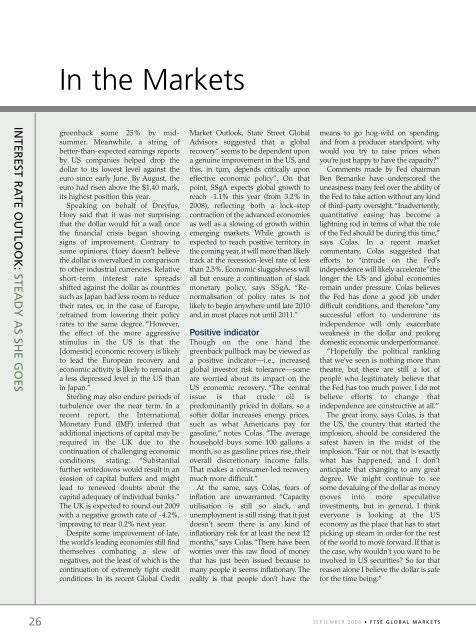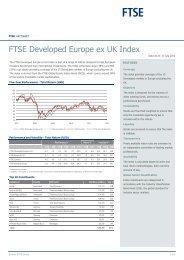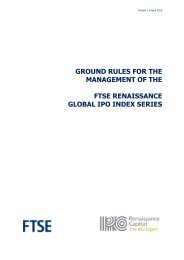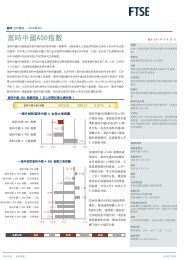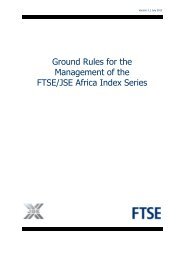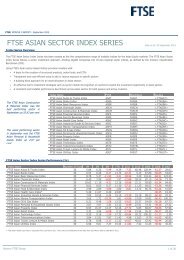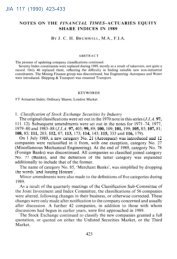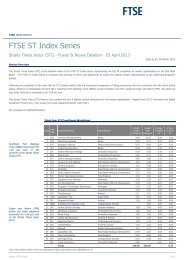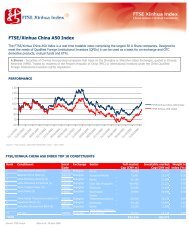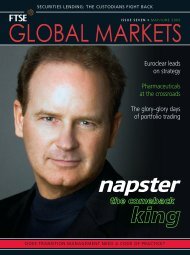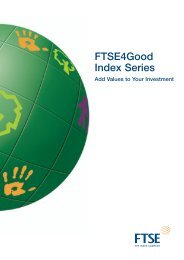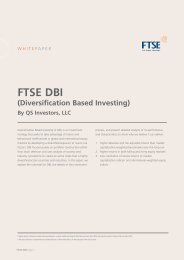Create successful ePaper yourself
Turn your PDF publications into a flip-book with our unique Google optimized e-Paper software.
INTEREST RATE OUTLOOK: STEADY AS SHE GOES<br />
26<br />
In the Markets<br />
greenback some 25% by midsummer.<br />
Meanwhile, a string of<br />
better-than-expected earnings reports<br />
by US companies helped drop the<br />
dollar to its lowest level against the<br />
euro since early June. By August, the<br />
euro had risen above the $1.40 mark,<br />
its highest position this year.<br />
Speaking on behalf of Dreyfus,<br />
Hoey said that it was not surprising<br />
that the dollar would hit a wall once<br />
the financial crisis began showing<br />
signs of improvement. Contrary to<br />
some opinions, Hoey doesn’t believe<br />
the dollar is overvalued in comparison<br />
to other industrial currencies. Relative<br />
short-term interest rate spreads<br />
shifted against the dollar as countries<br />
such as Japan had less room to reduce<br />
their rates, or, in the case of Europe,<br />
refrained from lowering their policy<br />
rates to the same degree. “However,<br />
the effect of the more aggressive<br />
stimulus in the US is that the<br />
[domestic] economic recovery is likely<br />
to lead the European recovery and<br />
economic activity is likely to remain at<br />
a less depressed level in the US than<br />
in Japan.”<br />
Sterling may also endure periods of<br />
turbulence over the near term. In a<br />
recent report, the International<br />
Monetary Fund (IMF) inferred that<br />
additional injections of capital may be<br />
required in the UK due to the<br />
continuation of challenging economic<br />
conditions, stating: “Substantial<br />
further writedowns would result in an<br />
erosion of capital buffers and might<br />
lead to renewed doubts about the<br />
capital adequacy of individual banks.”<br />
The UK is expected to round out 2009<br />
with a negative growth rate of -4.2%,<br />
improving to near 0.2% next year.<br />
Despite some improvement of late,<br />
the world’s leading economies still find<br />
themselves combating a slew of<br />
negatives, not the least of which is the<br />
continuation of extremely tight credit<br />
conditions. In its recent Global Credit<br />
Market Outlook, State Street Global<br />
Advisors suggested that a global<br />
recovery“ seems to be dependent upon<br />
a genuine improvement in the US, and<br />
this, in turn, depends critically upon<br />
effective economic policy”. On that<br />
point, SSgA expects global growth to<br />
reach -1.1% this year (from 3.2% in<br />
2008), reflecting both a lock-step<br />
contraction of the advanced economies<br />
as well as a slowing of growth within<br />
emerging markets. While growth is<br />
expected to reach positive territory in<br />
the coming year, it will more than likely<br />
track at the recession-level rate of less<br />
than 2.5%. Economic sluggishness will<br />
all but ensure a continuation of slack<br />
monetary policy, says SSgA. “Renormalisation<br />
of policy rates is not<br />
likely to begin anywhere until late 2010<br />
and in most places not until 2011.”<br />
Positive indicator<br />
Though on the one hand the<br />
greenback pullback may be viewed as<br />
a positive indicator—i.e., increased<br />
global investor risk tolerance—some<br />
are worried about its impact on the<br />
US economic recovery. “The central<br />
issue is that crude oil is<br />
predominantly priced in dollars, so a<br />
softer dollar increases energy prices,<br />
such as what Americans pay for<br />
gasoline,” notes Colas. “The average<br />
household buys some 100 gallons a<br />
month, so as gasoline prices rise, their<br />
overall discretionary income falls.<br />
That makes a consumer-led recovery<br />
much more difficult.”<br />
At the same, says Colas, fears of<br />
inflation are unwarranted. “Capacity<br />
utilisation is still so slack, and<br />
unemployment is still rising, that it just<br />
doesn’t seem there is any kind of<br />
inflationary risk for at least the next 12<br />
months,” says Colas.“There have been<br />
worries over this raw flood of money<br />
that has just been issued because to<br />
many people it seems inflationary. The<br />
reality is that people don’t have the<br />
means to go hog-wild on spending,<br />
and from a producer standpoint, why<br />
would you try to raise prices when<br />
you’re just happy to have the capacity?”<br />
Comments made by Fed chairman<br />
Ben Bernanke have underscored the<br />
uneasiness many feel over the ability of<br />
the Fed to take action without any kind<br />
of third-party oversight.“Inadvertently,<br />
quantitative easing has become a<br />
lightning rod in terms of what the role<br />
of the Fed should be during this time,”<br />
says Colas. In a recent market<br />
commentary, Colas suggested that<br />
efforts to “intrude on the Fed’s<br />
independence will likely accelerate”the<br />
longer the US and global economies<br />
remain under pressure. Colas believes<br />
the Fed has done a good job under<br />
difficult conditions, and therefore “any<br />
successful effort to undermine its<br />
independence will only exacerbate<br />
weakness in the dollar and prolong<br />
domestic economic underperformance.<br />
“Hopefully the political rankling<br />
that we’ve seen is nothing more than<br />
theatre, but there are still a lot of<br />
people who legitimately believe that<br />
the Fed has too much power. I do not<br />
believe efforts to change that<br />
independence are constructive at all.”<br />
The great irony, says Colas, is that<br />
the US, the country that started the<br />
implosion, should be considered the<br />
safest haven in the midst of the<br />
implosion.“Fair or not, that is exactly<br />
what has happened, and I don’t<br />
anticipate that changing to any great<br />
degree. We might continue to see<br />
some devaluing of the dollar as money<br />
moves into more speculative<br />
investments, but in general, I think<br />
everyone is looking at the US<br />
economy as the place that has to start<br />
picking up steam in order for the rest<br />
of the world to move forward. If that is<br />
the case, why wouldn’t you want to be<br />
involved in US securities? So for that<br />
reason alone I believe the dollar is safe<br />
for the time being.”<br />
S E P T E M B E R 2 0 0 9 • F T S E G L O B A L M A R K E T S


